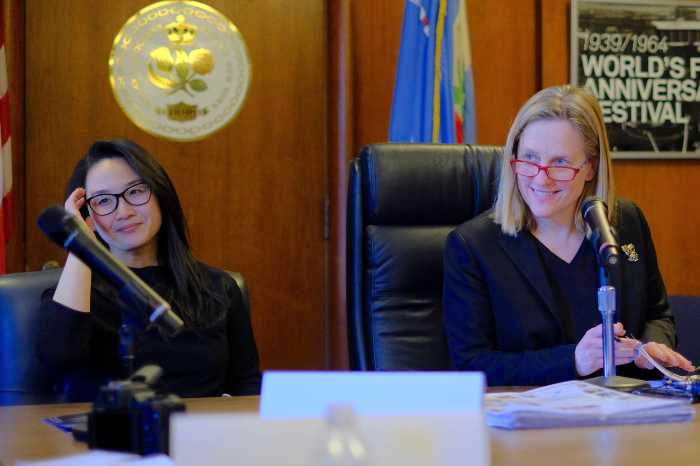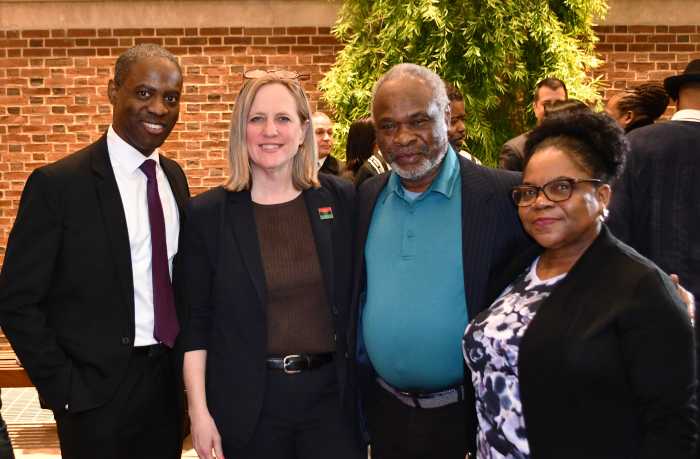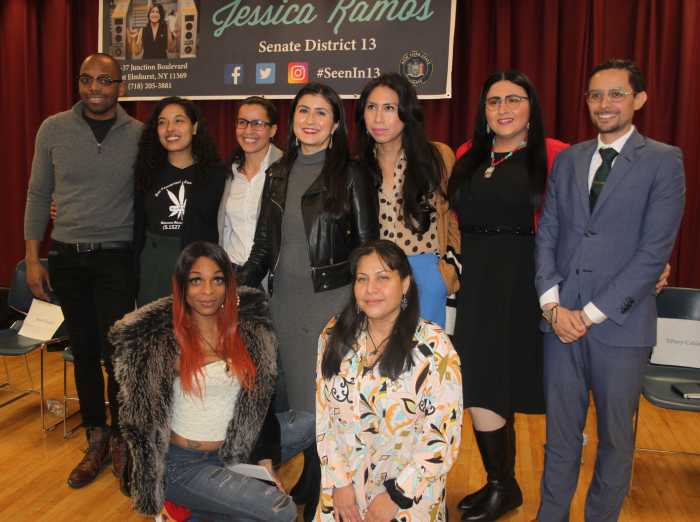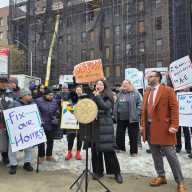BY MATT TRACY
Less than a year after Melinda Katz told one LGBTQ political club that she backed the outright legalization of sex work and conveyed to another queer club that she would focus on prosecuting “human traffickers or those who force people into sex work,” the top prosecutor in Queens is singing a different tune now that she’s in office — and advocates are fed up.
DecrimNY, the coalition driving the movement to fully decriminalize sex work in New York, joined a chorus of advocates on the issue, including Queens lawmakers, queer political club leaders, and other political figures who are criticizing Katz after she vowed to “aggressively” target buyers of sex work services as part of her newly-unveiled Human Trafficking Bureau.
In an announcement previewing the office, Katz invoked transgender victims of trafficking, vowed to support sex workers, and claimed that the office is committed to combating sex and labor trafficking — a key component of the DecrimNY platform — but then came the fine print. The DA’s explicit plans to go after buyers is a route that advocates have long said could cut off the main source of revenue for sex workers and put them or others they know at risk of getting swept up in the criminal justice system.
Decriminalization backers have also stressed that the interconnected system that makes up the sex trade requires comprehensive reform in order to foster a truly safe environment for workers.
“We have been clear from the start that criminalizing any side of the exchange will cause further harm to people who trade sex,” Leila Raven, who is on the steering committee for DecrimNY, told Gay City News on behalf of the coalition. “Peers and roommates are often charged as third parties, or even as traffickers, for sharing housing and safety strategies. We are disappointed that DA Katz is pursuing an approach that has been proven to put sex workers and survivors at increased risk of violence and exploitation.”
Raven also warned that Black, Latinx, and Asian sex workers — especially those who are poor and carry out their work on the street — will be most impacted by the approach employed by Katz.
Red Canary Song, a collective of Asian sex workers and allies, retweeted a series of Twitter posts critical of Katz’s new plan, including a tweet by Maya Morena asserting that the prosecutor leading the new office, Jessica L. Melton, “literally fights to ensure that sex workers are evicted, denied services, and any business (lower-income businesses) serving people who only use cash (aka poor poeple), and doesn’t have papers (undocumented immigrants) are destroyed.”
For much of the hotly-contested campaign for Queens district attorney, Katz, then borough president, took a timid approach to the topic of sex work while her opponent, out queer public defender Tiffany Cabán, rose to prominence with a campaign that explicitly called for the comprehensive decriminalization of sex work for workers, buyers, and those who help facilitate sex work.
That campaign coincided with increased movement on the issue in the State Legislature, where DecrimNY advocates worked with lawmakers last June to introduce the Stop Violence in the Sex Trades Act, a bill that would decriminalize sex work across the board. Although that bill has yet to move, advocates have focused on a more immediate goal of repealing the “Walking While Trans” loitering law that has been primarily enforced in a way targeting transgender women of color.

Though Katz, who went on to edge Cabán by a razor-thin margin in the Democratic primary and coasted to victory in the general election, didn’t go as far as her rival on the issue, she avoided expressing her reservations in writing about a decriminalization route when she sought the endorsements of LGBTQ political clubs that were closely following the issue.
In fact, Katz and Cabán both told the Jim Owles Liberal Democratic Club that they supported the legalization of sex work, a position that Cabán later clarified, saying she backed the decriminalization route. Notably, advocates have repeatedly stressed that they specifically seek decriminalization and not legalization — the latter term denoting an approach involving active government regulation.
In response to Katz’s plans to open the bureau, Cabán argued that her formal rival must go further if she wishes to actually fight trafficking in the city’s most diverse borough.
“To effectively combat sex trafficking, we need to decriminalize sex work,” Cabán said in a tweet. “That means sellers *and* buyers. This policy does not serve public health or public safety. It makes an already vulnerable sex work community more vulnerable.”
Katz also omitted plans to go after buyers when she turned in a questionnaire for the Stonewall Democratic Club of New York City, which went on to endorse her in the race. She told the club that she “will not prosecute sex workers, but I will prosecute human traffickers or those who force people into sex work by coercion or threats of violence.”
The club’s president, Brian Romero, told Gay City News that the club applauds Katz’s efforts to take on trafficking, which he said is a crime that must be addressed in the city and the state. But he also warned that human trafficking and consensual sex “must not be conflated.”
“We remain concerned about the DA prosecuting people who buy sex and that this will result in the criminalization of queer and trans immigrants and sex workers, particularly from Black and Brown communities,” Romero said in a written response to the newspaper. “Stonewall Democratic Club of NYC maintains that in order to reduce harm perpetuated onto sex workers and their families, we cannot support a Nordic/ End Demand model approach and New York must pass the Stop Violence in the Sex Trades Act.”
Among others to chime in following the Katz announcement included Queens State Senator Jessica Ramos, who is carrying the Stop Violence in the Sex Trades bill in the upper chamber alongside Brooklyn State Senator Julia Salazar.
“Public policy should be about keeping all people safe,” Ramos tweeted. “Prosecuting buyers of sex will only put more people in danger. Customers won’t be incentivized to give sex workers their real name, thus rendering sex workers defenseless if a customer becomes violent.”
Katz did not offer comment for this story in response to Gay City News’ query.
This story first appeared on gaycitynews.com.
































